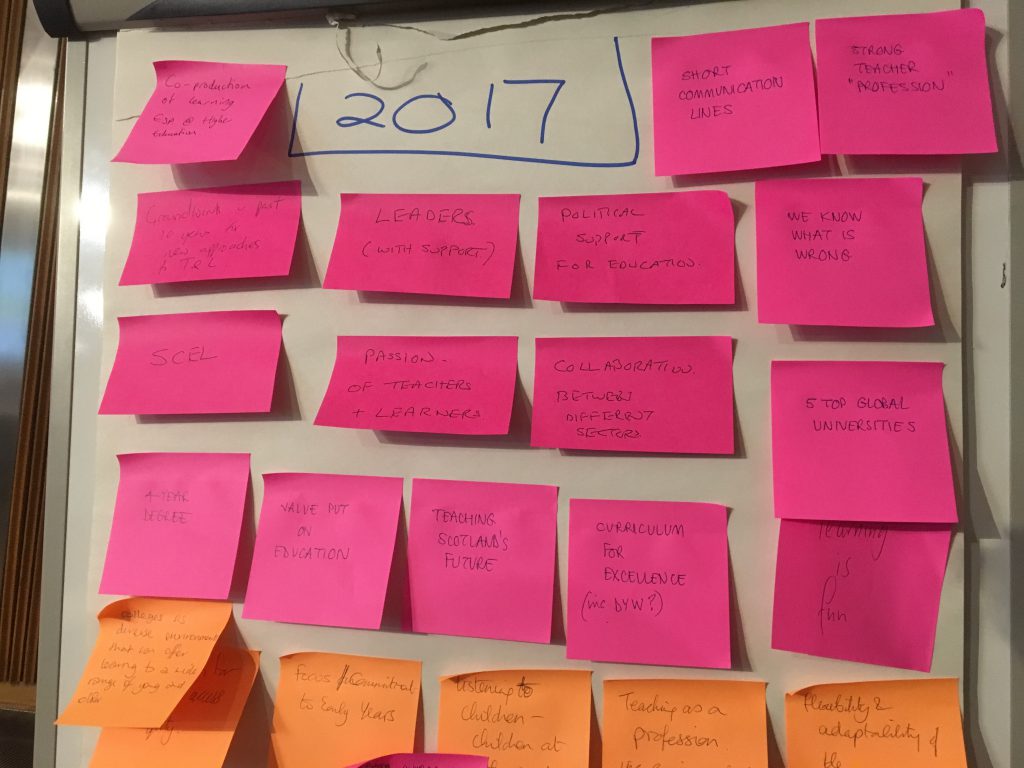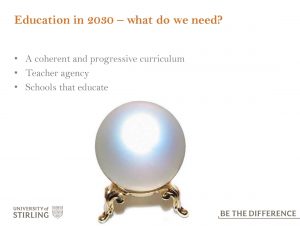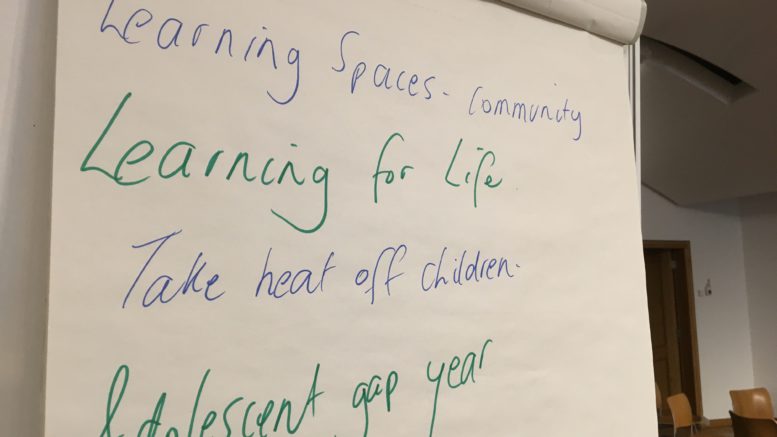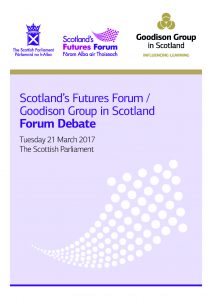Scotland 2030: Goodison Group in Scotland Forum Debate
To kick off its investigation into education and learning in the future, the Goodison Group in Scotland held a debate on 21 March 2017 on our aspirations for education in 2030 in conjunction with Scotland’s Futures Forum.
With input from curriculum expert Professor Mark Priestley of the University of Stirling, the debate considered the questions of what we want children and young people to get out of the education process and what an excellent curriculum could and should look like in 2030 and beyond.
Current successes
The objective of this session was to put a ‘stake in the ground’ and very broadly start to identify aspirations: a ‘straw scenario’ for schooling, education and learning in 2030 and beyond.
As a starting point, before being catapulted into 2030 and beyond, participants were asked to take a few minutes to reflect on 2017 and consider the core factors that make the education system and process function at its best.
The key themes identified included:
Political support
- Political support for education and the value placed on education
- Commitment to and focus on early years
- Increased awareness of the importance of leadership across the system
- Short communication lines
The curriculum
- Curriculum for Excellence, particularly the flexibility and adaptability it offers
- The groundwork in the past 10 years for new approaches to teaching and learning
- Schools that engage with the ‘real world’ to give education purpose and link learning together in challenging projects
Schools
- Vibrant primary schools, geared up for Curriculum for Excellence, and offering a positive environment
- Parental and community engagement
- The dedication, passion and commitment of teachers
- Growing awareness of children’s rights and the importance of their participation in decision-making
- For children who ‘do well’, they can do very well
Tertiary education
- Colleges as diverse environments that can offer learning to a wide range of age groups
- The range of opportunities for young people and multiple pathways of learning
- The establishment of the Commission on Widening Access
- Five top global universities
- Four-year degrees

A vision of 2030
Participants were then asked to imagine it was 2030 and the educational processes, system and curriculum were positively contributing to our culture and society. In imagining such a future, participants were asked to consider the following:
- What’s happening that makes schools vibrant and successful?
- What has changed? What has stayed the same?
- What are the external factors and drivers that have shaped, disrupted and influenced the education process and the curriculum?
- What are children and young people getting from the education process and the curriculum?
Key ideas to arise included:
- A shared understanding of the purpose of education across society, leading to a system that is well-resourced and easy to navigate and which puts a strong emphasis on lifelong learning.
- High quality, early years provision that links to the rest of the education system, and no perceptible gender imbalance within the system.
- A teenage “gap year” offered in recognition of research that shows that adolescents’ attention spans and their ability to digest information can be adversely affected because their brains are still developing.
- A curriculum that is regularly revisited to ensure its effectiveness.
- An understanding of the importance of knowledge rather than subjects, with a blurring of boundaries between different subjects.
- School buildings being pastoral centres at the heart of their local community, offering flexible, innovative learning spaces for people of all ages.
- Peer to peer and intergenerational interactions and learning, with children routinely involved in decisions that influence the school environment
- Teaching being a highly valued and desirable profession, with teachers who have spent more than 10 years in the profession being encouraged to take a gap year to widen their life experience and retain their passion for their subject.
- A common language used to describe what people gain from the education process.
The full straw scenario of schooling and the curriculum in 2030 and beyond, based on the group discussions, is outlined in the event report.
Presentation
Professor Mark Priestley, the University of Stirling

Opening his formal presentation, Prof. Priestley began by questioning some of the dichotomies that are current in discussions about education: skills over knowledge; teaching for jobs that don’t yet exist versus training for jobs that do exist; the teacher as ‘guide on the side’ rather than ‘sage on the stage’.
In his view, this rhetoric can lead to a narrow economic view of education which overlooks how we develop the human being and promote social cohesion.
Prof. Priestley advocated that the question of what an educated person looks like should be at the heart of the curriculum, and that overall, schooling should be about promoting citizenship, employability and nurturing individual talent while encouraging social cohesion.
In considering what we want from schooling in 2030, Prof. Priestley proposed three things:
A coherent and progressive curriculum
If teachers start with a shared understanding of the purpose of education, rather than moving straight to learning outcomes, fit-for-purpose practices will emerge.
Prof. Priestley suggested that Scotland had the makings of a coherent and progressive curriculum with Curriculum for Excellence but competing priorities in schools had led to a confused enactment of Curriculum for Excellence, resulting in a loss of the bigger picture.
Teacher agency
Teacher agency requires teachers who can take initiative, work collegially, have expansive aspirations for education and know how to think educationally rather than which box to tick.
Schools that educate
Schools need to educate rather than ‘school’. Prof. Priestley expressed a desire that, by 2030 we have moved away from a narrow focus on exams and employability skills, and environments that discipline and constrain. Instead, he hoped to see schools with knowledge-rich curricula, which are vibrant civic societies where the focus is on education not ‘learnification’.
Discussion
In the ensuing discussion, it was suggested that the importance of knowledge over subjects had yet to emerge from Curriculum for Excellence.
Prof Priestley agreed and suggested that if we wanted to hybridise subjects, as had been achieved in Finland, then we needed to do the groundwork with teachers who still see themselves as coming from particular disciplines.
It was highlighted that while we might want to broaden the focus of education, children emerge from school into a society that is judging them on a narrow set of criteria. Prof Priestley acknowledged that there was a need to have some kind of leaving certificate but a wider discussion was required with parents as well as teachers about different types of assessment to overcome resistance to coursework.
There was agreement that Scotland may have missed a trick by not introducing a baccalaureate alongside Curriculum for Excellence, particularly given the current threat of a narrowing of opportunities and subject choice at S4. However, it was acknowledged that introducing a baccalaureate was a high-risk strategy.
Read the Education in 2030: Our Aspirations – Event Report
Background information on the GGiS project is available on the Future Schooling, Learning and Education Approaches homepage.




